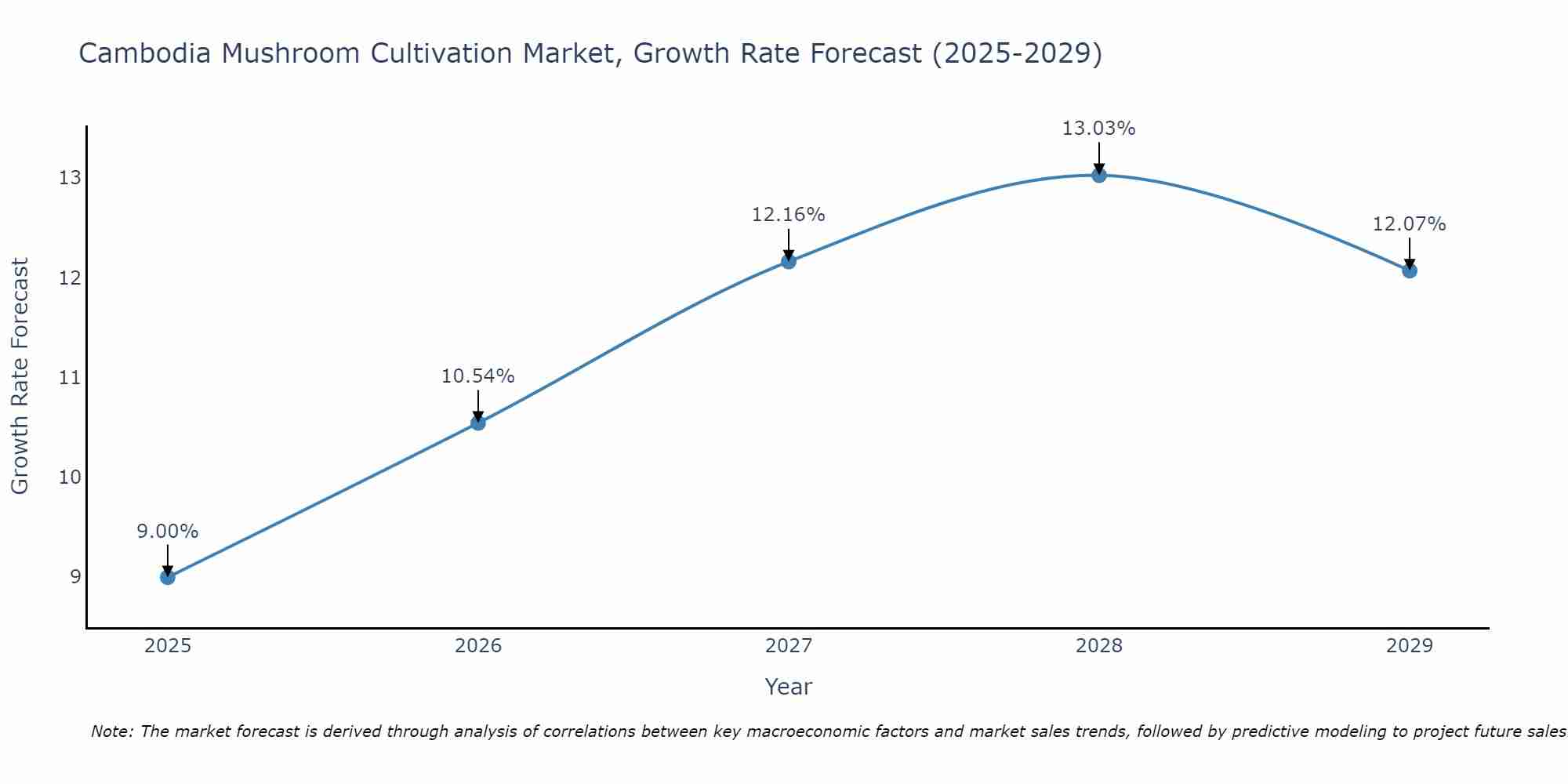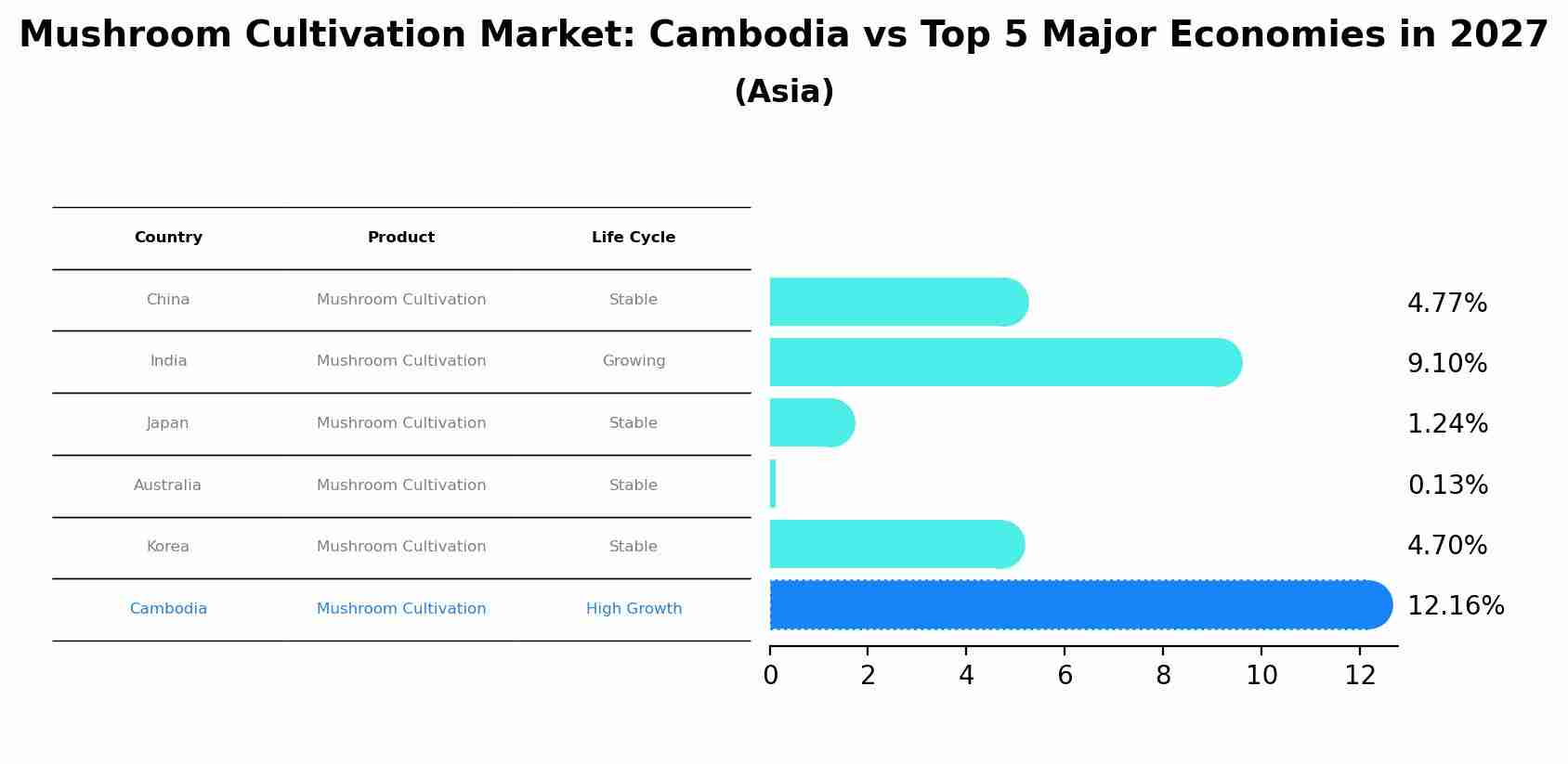Cambodia Mushroom Cultivation Market (2025-2031) Outlook | Industry, Companies, Analysis, Size, Forecast, Trends, Share, Value, Revenue & Growth
| Product Code: ETC383133 | Publication Date: Aug 2022 | Updated Date: Apr 2025 | Product Type: Market Research Report | |
| Publisher: 6Wresearch | Author: Shubham Padhi | No. of Pages: 75 | No. of Figures: 35 | No. of Tables: 20 |
Cambodia Mushroom Cultivation Market Size Growth Rate
The Cambodia Mushroom Cultivation Market is projected to witness mixed growth rate patterns during 2025 to 2029. Growth accelerates to 13.03% in 2028, following an initial rate of 9.00%, before easing to 12.07% at the end of the period.

Mushroom Cultivation Market: Cambodia vs Top 5 Major Economies in 2027 (Asia)
The Mushroom Cultivation market in Cambodia is projected to grow at a high growth rate of 12.16% by 2027, highlighting the country's increasing focus on advanced technologies within the Asia region, where China holds the dominant position, followed closely by India, Japan, Australia and South Korea, shaping overall regional demand.

Cambodia Mushroom Cultivation Market Overview
Mushroom cultivation is emerging as a viable agricultural activity in Cambodia, offering opportunities for smallholder farmers to diversify their income sources. With increasing consumer awareness about the nutritional and culinary benefits of mushrooms, the demand for cultivated mushrooms is on the rise, driving market growth.
Drivers of the market
The Cambodia mushroom cultivation market is experiencing growth driven by several factors, including increasing awareness about the nutritional benefits of mushrooms and the rising demand for alternative sources of protein. Mushrooms are rich in nutrients, vitamins, and antioxidants, making them a popular choice among health-conscious consumers. Additionally, mushroom cultivation requires less space and resources compared to traditional agriculture, making it an attractive option for small-scale farmers. As the government promotes mushroom cultivation as a sustainable and lucrative agricultural venture, the market continues to expand.
Challenges of the market
In Cambodia mushroom cultivation market, one of the primary challenges is ensuring consistent quality and supply to meet growing demand. While mushrooms are increasingly popular for their nutritional value and culinary versatility, achieving consistent yields and quality standards can be challenging due to factors such as climate variability, pests, and diseases. Moreover, there may be challenges related to access to quality spawn, technical know-how, and market infrastructure, particularly in rural areas. Additionally, market education and awareness campaigns may be necessary to promote the benefits of mushroom cultivation and encourage adoption among farmers and consumers.
Government Policy of the market
To promote agricultural diversification, food security, and rural development, the Cambodian government is implementing policies to support mushroom cultivation initiatives. These policies include training programs for farmers, access to financing and agricultural inputs, research and extension services, market linkages, and quality standards enforcement to enhance productivity, profitability, and sustainability in the mushroom industry.
Key Highlights of the Report:
- Cambodia Mushroom Cultivation Market Outlook
- Market Size of Cambodia Mushroom Cultivation Market, 2024
- Forecast of Cambodia Mushroom Cultivation Market, 2031
- Historical Data and Forecast of Cambodia Mushroom Cultivation Revenues & Volume for the Period 2021-2031
- Cambodia Mushroom Cultivation Market Trend Evolution
- Cambodia Mushroom Cultivation Market Drivers and Challenges
- Cambodia Mushroom Cultivation Price Trends
- Cambodia Mushroom Cultivation Porter's Five Forces
- Cambodia Mushroom Cultivation Industry Life Cycle
- Historical Data and Forecast of Cambodia Mushroom Cultivation Market Revenues & Volume By Type for the Period 2021-2031
- Historical Data and Forecast of Cambodia Mushroom Cultivation Market Revenues & Volume By Button Mushroom for the Period 2021-2031
- Historical Data and Forecast of Cambodia Mushroom Cultivation Market Revenues & Volume By Oyster Mushroom for the Period 2021-2031
- Historical Data and Forecast of Cambodia Mushroom Cultivation Market Revenues & Volume By Shiitake Mushroom for the Period 2021-2031
- Historical Data and Forecast of Cambodia Mushroom Cultivation Market Revenues & Volume By Others for the Period 2021-2031
- Cambodia Mushroom Cultivation Import Export Trade Statistics
- Market Opportunity Assessment By Type
- Cambodia Mushroom Cultivation Top Companies Market Share
- Cambodia Mushroom Cultivation Competitive Benchmarking By Technical and Operational Parameters
- Cambodia Mushroom Cultivation Company Profiles
- Cambodia Mushroom Cultivation Key Strategic Recommendations
Frequently Asked Questions About the Market Study (FAQs):
- Single User License$ 1,995
- Department License$ 2,400
- Site License$ 3,120
- Global License$ 3,795
Search
Thought Leadership and Analyst Meet
Our Clients
Related Reports
- Canada Oil and Gas Market (2026-2032) | Share, Segmentation, Value, Industry, Trends, Forecast, Analysis, Size & Revenue, Growth, Competitive Landscape, Outlook, Companies
- Germany Breakfast Food Market (2026-2032) | Industry, Share, Growth, Size, Companies, Value, Analysis, Revenue, Trends, Forecast & Outlook
- Australia Briquette Market (2025-2031) | Growth, Size, Revenue, Forecast, Analysis, Trends, Value, Share, Industry & Companies
- Vietnam System Integrator Market (2025-2031) | Size, Companies, Analysis, Industry, Value, Forecast, Growth, Trends, Revenue & Share
- ASEAN and Thailand Brain Health Supplements Market (2025-2031) | Strategy, Consumer Insights, Analysis, Investment Trends, Opportunities, Growth, Size, Share, Industry, Revenue, Segments, Value, Segmentation, Supply, Forecast, Restraints, Outlook, Competition, Drivers, Trends, Demand, Pricing Analysis, Competitive, Strategic Insights, Companies, Challenges
- ASEAN Bearings Market (2025-2031) | Strategy, Consumer Insights, Analysis, Investment Trends, Opportunities, Growth, Size, Share, Industry, Revenue, Segments, Value, Segmentation, Supply, Forecast, Restraints, Outlook, Competition, Drivers, Trends, Demand, Pricing Analysis, Competitive, Strategic Insights, Companies, Challenges
- Europe Flooring Market (2025-2031) | Outlook, Share, Industry, Trends, Forecast, Companies, Revenue, Size, Analysis, Growth & Value
- Saudi Arabia Manlift Market (2025-2031) | Outlook, Size, Growth, Trends, Companies, Industry, Revenue, Value, Share, Forecast & Analysis
- Uganda Excavator, Crane, and Wheel Loaders Market (2025-2031) | Strategy, Consumer Insights, Analysis, Investment Trends, Opportunities, Growth, Size, Share, Industry, Revenue, Segments, Value, Segmentation, Supply, Forecast, Restraints, Outlook, Competition, Drivers, Trends, Demand, Pricing Analysis, Competitive, Strategic Insights, Companies, Challenges
- Rwanda Excavator, Crane, and Wheel Loaders Market (2025-2031) | Strategy, Consumer Insights, Analysis, Investment Trends, Opportunities, Growth, Size, Share, Industry, Revenue, Segments, Value, Segmentation, Supply, Forecast, Restraints, Outlook, Competition, Drivers, Trends, Demand, Pricing Analysis, Competitive, Strategic Insights, Companies, Challenges
Industry Events and Analyst Meet
Whitepaper
- Middle East & Africa Commercial Security Market Click here to view more.
- Middle East & Africa Fire Safety Systems & Equipment Market Click here to view more.
- GCC Drone Market Click here to view more.
- Middle East Lighting Fixture Market Click here to view more.
- GCC Physical & Perimeter Security Market Click here to view more.
6WResearch In News
- Doha a strategic location for EV manufacturing hub: IPA Qatar
- Demand for luxury TVs surging in the GCC, says Samsung
- Empowering Growth: The Thriving Journey of Bangladesh’s Cable Industry
- Demand for luxury TVs surging in the GCC, says Samsung
- Video call with a traditional healer? Once unthinkable, it’s now common in South Africa
- Intelligent Buildings To Smooth GCC’s Path To Net Zero


















